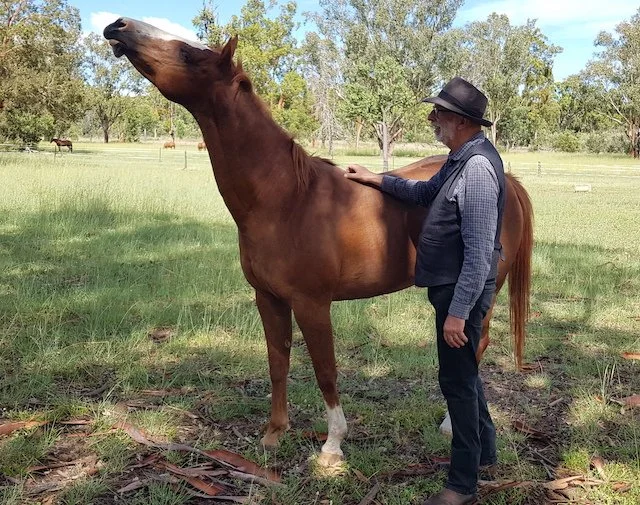I want to talk about the use of reward in the training process.
For the purpose for this discussion I am going to use reward in fairly broad terms to mean something that motivates a horse to repeat a behaviour. It could be the removal of a stressor (like pressure) or the presentation of a prize like food.
We have all heard that horses learn from the reward. It is not pressure or the desired behaviour itself that teaches. It is the reward that follows, that provides the light bulb moment to a horse and the incentive to repeat the response we wanted.
However, for a reward to be an effective training tool, certain things have to come together.
Firstly, the reward has to be something the horse desires. It’s not enough to reward a horse with a pat or a “good boy”, if they are not things the horse perceives as rewarding. It’s not enough to offer a horse a slice of apple, if the horse is so distracted that it is not interested in food. The reward has to be something that the horse would want to happen again. It can change from moment to moment with a horse. It’s not always the same thing, every time. For example, a reward for a horse that stands quietly when tied to a post might be to be allowed back to the paddock with his mates today. However, tomorrow it might be enough to scratch its itchy spot behind the ears.
Another aspect of offering a horse an effective reward is being able to link the reward to the response we wanted. This is multi-faceted and beyond the scope of this post to discuss in any detail. However, this concept places the burden on our ability to practice timing, feel, balance and consistency.
If we use food or scratches or gentle words to reward our horse, we need to be specific and judicious in how we use them. It’s not enough to wander over to a horse, offer a carrot to eat and expect that the horse learned something about focus, clarity and softness. The offer of the carrot has to be linked to an idea in the horse’s mind. If we present behaviour A, and the horse responds with behaviour B, we follow with reward C. That’s how it needs to work.
This may seem self evident, but one of the things I have noticed over the years is people’s lack of understanding about how a horse perceives a reward very often gets in the way of presenting a clear link of the reward to the response. For instances, the biggest problem with using food as a reward is that is often transfers a horse’s focus from the job we want, to the food. It is only after going through a lot of angst and repetition do many horses realize that in order to be given a treat, they first need to offer a specific response first. That’s why using a marker (such as a click sound) was invented in positive reinforcement training.
Even when using negative reinforcement, where the removal of pressure is the most common form of reward, many times people’s method of offering a horse relief from pressure is not mindful of how a horse links it to a behaviour. An example of this can be when a rider uses the left rein to ask a horse to turn left, and releases the rein so abruptly at the moment of the horse’s response that it almost shocks a horse and acts as another stressor instead of a relief from stress. Or sometimes, the rein pressure is removed too slowly and the horse does not see an incentive to repeat the response we wanted.
These are just a few examples, but there are a lot of different scenarios where people are not clear in the way they offer a reward.
The onus is on us to be mindful that a reward is different things to different horses at different times. And the way we build an association in a horse’s mind between a specific behaviour and a reward is through our ability to constantly make adjustments to our timing, feel and balance; our ability to be consistent in how we ask and what we reward, and a horse’s ever-changing thoughts and feelings that orchestrate how we implement and put into practice all of the elements.
I’m not rewarding Chops for any specific behaviour. The purpose here is for Chops to associate the idea that hanging with me is not always about work or costs her something.

